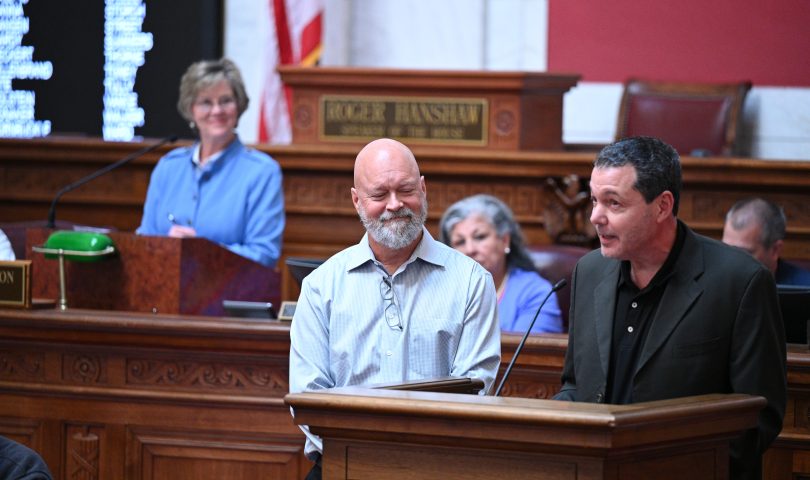MORGANTOWN – State legislators heard a plug for a new Morgantown-based addiction recovery program, and a suggestion that similar programs be started across the state — maybe using some funds from opioid lawsuit settlements. They also got an update on the explosive growth of the medical cannabis program.
Tuesday was the final day of April interim meetings at the Capitol and the joint Health Committee heard the presentations.
The recovery center is Lauren’s Wish Addiction Triage Center, a 28-bed facility located in Hazel’s House of Hope – the former Ramada Inn – in Morgantown. Two of its six directors – Dr. Kevin Blankenship and Edward Boyle – explained what the center does and why more are needed.
Boyle cited some numbers – 106,000 overdoses nationally in 2021 with more than70,000 of them from fentanyl or opioids. In West Virginia, from March 2021 to March 2022, 1,403 fentanyl overdoses.
While doing research on the issue, they said, they discovered a gap in the overdose recovery process. A person who overdoses goes to the emergency room, maybe gets Narcan, gets stabilized and then released. They call this “treat and street.”
But, Boyle said, unless people have family support or the financial means to take the next step in treatment, they go right back to their old environment.
Blankenship, who also runs Jacob’s Ladder long-term recovery center in Aurora, said most recovery programs last 30 days at best, while Jacob’s Ladder’s program goes for several months, with three to six months of sober living after that. “Addiction takes time to heal from.”
Lauren’s Wish, he said, fills the time between acute crisis and getting to a long-term bed; the patients are kept safe and healthy and transported to their ultimate goal.
But, he said, Lauren’s Wish is not eligible for Medicaid or insurance reimbursement, and is dependent on grants and fundraising. With the state looking at how to spend opioid settlement funds, Lauren’s Wish hopes legislators might keep them in mind (neither specifically pointed to settlement funds, but to money coming to the state to deal with the drug crisis).
But Lauren’s Wish is drawing patients from across the state and from other states, Blankenship said, “and we haven’t even advertised we exist yet. … This needs to be replicated throughout the state.” He suggested five to six sites located regionally for easy access.
Lauren’s Wish, they said, has received 152 clients since it opened in November and placed them in a variety of aftercare or recovery processes.
Medical cannabis program
Chrystal Lowe, interim director of the Office of Medical Cannabis, provided a program update.
The program is in its fifth year, and began accepting grower-processsor-dispensary applications in late 2019, she said. Now there are nine permitted growers, seven processors and 48 dispensaries.
Patients do not receive prescriptions, she reminded the legislators, but are certified by a participating physician that they have a qualifying medical condition. There are 131 registered physicians and 17 active telemedicine companies providing certification.
Patient sign-ups began in October 2021. There have been 25,420 applications received and 21,005 patients approved.
The business has generated $40.97 million in sales and just over $4 million in tax revenue; with 6,094 pounds of products sold – 786,287 individual items. The industry directly and indirectly employs about 2,000 people.
Among the qualifying conditions, Lowe said, chronic pain is th emost common, though many ID card holders have more than one condition. Most patients – 43.8% – fall in the 35-54 age group; the 55-64 age group is a distant second, at 18.8%.
Patients can find an interactive map to locate dispensaries at omc.wv.gov.
Lowe spent a few minutes addressing common myths about the program.
Among them is the myth that edibles are permitted. They are not.
Another is that medical insurance covers treatment. It does not, not even the physician consultation to get certified.
Another, that employees with ID cards are protected from employment issues. That’s only partially true: Employers may not discriminate based on someone holding a medical cannabis ID card, but employees are not protected from employment decisions based on someone using medical cannabis.
One last myth is that smoking cannabis flower is permitted. It’s not, flower may be used only for ebullition or vaporization.
Committee co-chair Delegate Amy Summers, R-Taylor, reminded Lowe that when the original legislation passed in 2017, the office was supposed to undertake a study to evaluate if the program is helping patients or just adding to the addiction crisis. She asked Lowe when the study will get started.
Lowe said they don’t know; a banking issue in the state treasurer’s office means they can’t get money to pay for the study.
Tweet David Beard @dbeardtdp Email dbeard@dominionpost.com




